- Home
- Terry Brooks
Unfettered
Unfettered Read online
Unfettered is a work of fiction. All of the characters, organizations, and events portrayed in these stories are either products of the authors’ imaginations or are used fictitiously.
UNFETTERED
Copyright © 2013 by Shawn Speakman.
All rights reserved.
“Imaginary Friends” by Terry Brooks. © 1991 by Terry Brooks.
“How Old Holly Came To Be” by Patrick Rothfuss. © 2013 by Patrick Rothfuss.
“The Old Scale Game” by Tad Williams. © 2013 by Beale-Williams Enterprise.
“Game of Chance” by Carrie Vaughn. © 2013 by Carrie Vaughn, LLC.
“The Martyr of the Roses” by Jacqueline Carey. © 1996 by Jacqueline Carey.
“Mudboy” by Peter V. Brett. © 2013 by Peter V. Brett.
“The Sound of Broken Absolutes” by Peter Orullian. © 2013 by Peter Orullian.
“The Coach with Big Teeth” by R.A. Salvatore. © 1996 by R.A. Salvatore.
“Keeper of Memory” by Todd Lockwood. © 2013 by Todd Lockwood.
“Heaven in a Wild Flower” by Blake Charlton. © 2013 by Blake Charlton.
“Dogs” by Daniel Abraham. © 2013 by Daniel Abraham.
“The Chapel Perilous” by Kevin Hearne. © 2013 by Kevin Hearne.
“Select Mode” by Mark Lawrence. © 2013 by Mark Lawrence.
“All the Girls Love Michael Stein” by David Anthony Durham.
© 2013 by David Anthony Durham.
“Strange Rain” by Jennifer Bosworth. © 2013 by Jennifer Bosworth.
“Nocturne” by Robert V.S. Redick. © 2013 by Robert V.S. Redick.
“Unbowed” by Eldon Thompson. © 2013 by Eldon Thompson.
“In Favour with Their Stars” by Naomi Novik. © 2013 by Naomi Novik.
“River of Souls” by Robert Jordan & Brandon Sanderson.
© 2013 by The Bandersnatch Group, Inc.
“The Jester” by Michael J. Sullivan. © 2013 by Michael J. Sullivan.
“The Duel” by Lev Grossman. © 2013 by Lev Grossman.
“Walker and the Shade of Allanon” by Terry Brooks. © 2000 by Terry Brooks.
“The Unfettered Knight” by Shawn Speakman. © 2013 by Shawn Speakman.
All rights reserved.
Dust jacket and interior artwork by Todd Lockwood.
Copyediting and book design/composition by Rachelle Longé McGhee.
ebook design/layout by Michael J. Sullivan
Signed, Limited Edition ISBN 978-0-9847136-4-6
Trade Hardcover Edition ISBN 978-0-9847136-3-9
eBook ISBN 978-0-9847136-5-3
First Edition, July 2013
2 4 6 8 9 7 5 3 1
Grim Oak Press
PO Box 45173
Seattle, WA 98145
www.grimoakpress.com
For those with cancer and those who stand by them
Who battle together and show no quarter
“Pain shared, my brother, is pain not doubled but halved.”
—Neil Gaiman, Anansi Boys
“What are years to me? Like pain, they pass unnoticed.”
—Jay Lake, Kalimpura
CONTENTS
Foreword by Patrick Rothfuss
Introduction: On Becoming Unfettered
Imaginary Friends by Terry Brooks
How Old Holly Came To Be by Patrick Rothfuss
The Old Scale Game by Tad Williams
Game of Chance by Carrie Vaughn
The Martyr of the Roses by Jacqueline Carey
Mudboy by Peter V. Brett
The Sound of Broken Absolutes by Peter Orullian
The Coach with Big Teeth by R.A. Salvatore
Keeper of Memory by Todd Lockwood
Heaven in a Wild Flower by Blake Charlton
Dogs by Daniel Abraham
The Chapel Perilous by Kevin Hearne
Select Mode by Mark Lawrence
All the Girls Love Michael Stein by David Anthony Durham
Strange Rain by Jennifer Bosworth
Nocturne by Robert V.S. Redick
Unbowed by Eldon Thompson
In Favour with Their Stars by Naomi Novik
River of Souls by Robert Jordan & Brandon Sanderson
The Jester by Michael J. Sullivan
The Duel by Lev Grossman
Walker and the Shade of Allanon by Terry Brooks
The Unfettered Knight by Shawn Speakman
Acknowledgments
FOREWORD
by Patrick Rothfuss
Can I be honest here? I don’t read forewords.
Can I be painfully honest? I don’t even know what forewords are for.
Am I supposed to somehow convince you to buy this book? Are you, even now, standing in a bookstore, reading this, your gut roiling with indecision?
That doesn’t seem to make sense to me. For one thing, you can see the folks in this anthology. You’ve read their names on the cover. It couldn’t be more impressive if it included Lord Vishnu and Optimus Prime. If those names didn’t convince you, what could I possibly say that might tip you over the edge?
I mean, it is true that owning this book will make you roughly 38 percent more attractive. Its mere presence on your shelf boosts your metabolism too. And there’s the fact that touching it on a daily basis is proven to cure scrofula and reverse baldness.
Seriously, what do you expect? I’m in the book. And I’m a professional liar. You can’t trust my opinion on this matter. Of course I’d like you to buy it.
Maybe you’ve already bought this book, and now I’m supposed to somehow reassure you, make it clear you’ve spent your money wisely. Is that the point of a foreword? Am I just trying to help you stave off the chilly hand of buyer’s remorse?
It seems to me that in both those cases, you’d be better served just reading the book rather than looking here for answers. I mean, honestly. We’re 250 words in at this point. If you’d just skipped this foreword, you’d already be on the second page of one of the stories…
Well, fine. If you’re here, I guess you want something else. And given that I don’t know what I’m supposed to write in a foreword, I’m just going to tell you a story.
Back in 2007, my first book was published. Also in 2007, my mom died of cancer.
In 2007, I also met Shawn Speakman. I found out that he’d had cancer in the past and had beaten it. My thoughts at the time were an odd mingling of confused (“What? You can do that?”) and thrilled (“Yeah! Take that, goddamn cancer!”).
Then he contacted me in 2011 and told me that he’d gotten a new cancer. It’s hard to describe how I felt. “Pissed off” sums it up fairly well. But there was also a sense of unfairness to it all. Nobody should have to deal with that shit twice.
When I asked for details, I was glad to hear that it was very treatable. Very beatable. I think I said something like, “Damn. That’s really awful…but congrats on getting a really good cancer.”
Those of you who have had personal brushes with cancer will understand this statement; the rest of you, probably not so much.
But there was bad news. Shawn couldn’t get health insurance because he’d had cancer before. That meant his treatment was probably going to bankrupt him.
When he told me about his plans for an anthology to raise money for his bills, I said I’d be happy to give him a story. It was a no-brainer for me, as it allowed me to if not spit directly into cancer’s eye, then at least glare at it angrily from across the room.
The
fact that other authors have joined this anthology in such numbers shows what good folks sci-fi and fantasy authors are. I have a grudge against cancer. It was an easy choice for me. But a lot of them are merely doing this to help out a friend in a tight spot.
And by buying this book, you’ve helped too. Thanks for that. You’re a good person.
All right, I’ve wasted enough of your time here. On to the stories.
Patrick Rothfuss
Author
May 2013
INTRODUCTION
On Becoming Unfettered
When I was diagnosed with cancer in 2011, fear entered my life.
But not the fear you might think.
Cancer is a frightening disease. I think it is the initial uncertainty that strikes at the soul. Will I live? Will I die? Mortality is not a topic many contemplate until it is suddenly thrust upon them. It is too late for reflection by then, the fight just to survive eclipsing everything else. In my case, I had survived a different cancer ten years earlier and I had come to terms with my mortality then. So during my 2011 bout with Hodgkin’s lymphoma, those who knew me were not worried. They had seen me be a tough bastard before; they knew I would be one again.
I knew the same. I would bring my considerable emotional strength to bear and survive. I was not worried about dying.
I was worried about bankruptcy.
I knew I would be in financial dire straits from the outset. As a freelance writer and web designer, I do not have health insurance. As such, my cancer would be treated and I would receive the best in care, but that would also leave me destitute: I would likely have to declare medical bankruptcy, which would result in the fiscal ruination of the following decade. I had to do something.
After I had settled into my treatment schedule, I had lunch with New York Times best-selling author Terry Brooks. I have worked with Terry for fourteen years, as his webmaster and continuity editor, his friend and confidante. I asked if he’d be interested in donating a short story, the proceeds from which would go against my mounting debt.
He agreed. And added, “Why don’t you contact your other writer friends?”
Time is precious to writers; words are precious to their publishers. I decided to take the risk, be vulnerable, and ask those writers a question I had no business asking. I could damage working relationships; worse, I could ruin friendships.
I had to take that risk. And when my friends selflessly began donating short stories for what would become this anthology, tears of gratitude began to replace the fear I carried. Some of the best authors in the fantasy genre rallied around me. They bolstered me during my time of hardship. In turn, I refused to dictate what their story contributions should be. I would not chain these writers with a theme or any word-count restrictions—I wanted this to be theirs as much as it was “mine.”
Instead, they would be unfettered, free to write exactly what they wanted to donate.
And, in turn, I would become unfettered from medical debt.
Unfettered is an anthology filled with magic, wonderment, and hope. It is more than its combined stories, though. It is the power of friendship. Of giving. Of a science-fiction and fantasy community that protects its own. Of humanity escaping the ugliness that often plagues it to instead create a testament to the goodness found in every heart.
I am forever indebted to these writers as I am forever indebted to you readers.
As long as I am able, I will pay forward that debt.
I hope you enjoy Unfettered.
Shawn Speakman
Editor and Publisher
May 2013
Full disclaimer, right off the bat: I wrote this story back in early 1990 when Del Rey Books came to me for a piece to be included in a coffee-table book of modern fairy tales. Other contributors included Anne McCaffrey, Isaac Asimov, Lester del Rey, and half a dozen more. Since Lester was my editor and Judy-Lynn my champion, of course I agreed to contribute.
The collection was titled Once Upon a Time, and when it was published in 1991, “Imaginary Friends” was included.
So the story is neither brand-new nor unpublished. Of course, it has been out of print for quite a while, so at least it will seem new.
The idea for the story was already in my head when I was approached. For some time, I had been thinking of breaking away from the Shannara and Magic Kingdom series to write something new. I wanted to do a big, sprawling saga—another, obviously—but one that was situated in the present and in which the schematic of magic was so integral to what we know to be true about our world that it would feel entirely plausible. That meant the fantasy elements and magic devices I chose to employ had to have explanations that made them feel real to the reader.
I had envisioned this saga as a trilogy of books, all of them linked by a series of common elements, but never as a short story. However, since no one was clamoring for such an opus, I thought this would be a good chance to put something down on paper as a sort of rough blueprint of what I would one day have a chance to write in larger form.
So I wrote about Jack and his impish friend Pick and the owl Daniel and their lives together in Sinnissippi Park. Most of what I wrote in the shorter version was changed entirely in the longer. Yet I think you will find that the story stands up pretty well on its own merits.
Several years later, I would write the books that comprise the Word & Void series, but “Imaginary Friends” was the prototype. Read on, and you can discover a little about how the one led to the other.
— Terry Brooks
IMAGINARY FRIENDS
Terry Brooks
Jack McCall was ten days shy of his thirteenth birthday when he decided that he was dying. He had been having headaches for about six months without telling anyone, the headaches being accompanied by a partial loss of vision that lasted anywhere from ten to twenty minutes. He hadn’t thought much about it since it only happened once in a while, believing that it was simply the result of eyestrain. After all, there was a lot of homework assigned in the seventh grade.
But ten days before his birthday he had an attack as he was about to go out the door to school, and since he couldn’t very well ride his bike in that condition or stand around pretending that nothing was wrong, he was forced to admit the problem to his mother. His mother made an immediate appointment with Dr. Muller, the family pediatrician, for that afternoon, sat Jack down until his vision cleared, then drove him to school, asking him all the way there if he was all right and calling him “Jackie” until he thought he would scream.
She returned promptly when school let out to take him to his appointment. Dr. Muller was uncharacteristically cheerful as he checked Jack over, even going so far as to ruffle his hair and remark on how quickly he was growing. This was the same Dr. Muller who normally didn’t have two words for him. Jack began to worry.
When the doctor was finished, he sent Jack and his mother over to the hospital for further tests. The tests included X-rays, blood workups, an EKG, and a barrage of other examinations, all of which were administered by an uncomfortably youthful collection of nurses. Jack endured the application of cold metal implements to his body, let himself be stuck repeatedly with needles, breathed in and out, lay very still, jumped up and down, and mostly waited around in empty, sterile examination rooms. When the tests were all done, he was sent home knowing nothing more than he had when he arrived beyond the fact that he did not care ever to go through such an ordeal again.
That night, while Jack was upstairs in his room fiddling with his homework and listening to his stereo, Dr. Muller paid a visit to his house. His parents didn’t call for him, but that didn’t stop him from being curious. He slipped down the stairway to the landing and sat there in the dark on the other side of the half wall above the living room while Dr. Muller and his parents spoke in hushed tones. Dr. Muller did most of the talking. He said that the preliminary test results were back. He talked about the body and its cells and a bunch of other stuff, throwing in multisyllabic medical terms that Jack c
ouldn’t begin to understand.
Then he used the words “blood disorder” and “leukemia” and “cancer.” Jack understood that part. He might only be in seventh grade, but he wasn’t stupid.
He stayed on the stairway until he heard his mother start to cry, then crept back up to his room without waiting to hear any more. He sat there staring at his unfinished homework, trying to decide what he should be feeling. He couldn’t seem to feel anything. He heard Dr. Muller leave, and then his parents came up to see him. Usually they visited him individually; when they both appeared it was serious business. They knocked on the door, came inside when invited, and stood there looking decidedly uncomfortable. Then his father told him that he was sick and would have to take it easy for a while, his mother started crying and calling him “Jackie” and hugging him, and all of a sudden he was scared out of his socks.
He didn’t sleep much that night, letting the weight of what he had discovered sink in, trying to comprehend what his dying meant, trying to decide if he believed it was possible. Mostly, he thought about Uncle Frank. Uncle Frank had been his favorite uncle, a big man with strong hands and red hair who taught him how to throw a baseball. Uncle Frank used to take him to ballgames on Sunday afternoons. Then he got sick. It happened all at once. He went into the hospital and never came out. Jack’s parents took him to see Uncle Frank a couple of times. There was not much left of Uncle Frank by then. His once-strong hands were so frail he could barely lift them. All his hair had fallen out. He looked like an old man.
Then he died. No one came right out and said it, but Jack knew what had killed him. And he had always suspected, deep down inside where you hid things like that, that it might someday kill him, too.
The next morning Jack dressed, wolfed down his breakfast as quickly as he could, and got out of there. His parents were behaving like zombies. Only his little sister Abby was acting as if everything was all right, which was the way she always acted since she was only eight and never knew what was going on anyway.

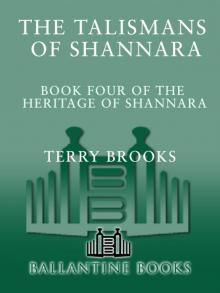 The Talismans of Shannara
The Talismans of Shannara The Sword of Shannara: The Druids' Keep: The Druids' Keep
The Sword of Shannara: The Druids' Keep: The Druids' Keep Witch Wraith
Witch Wraith The Elf Queen of Shannara
The Elf Queen of Shannara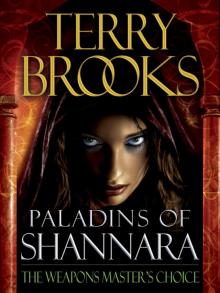 The Weapons Master's Choice
The Weapons Master's Choice The Scions of Shannara
The Scions of Shannara Armageddon's Children
Armageddon's Children The Sword of Shannara Trilogy the Sword of Shannara Trilogy
The Sword of Shannara Trilogy the Sword of Shannara Trilogy The Darkling Child
The Darkling Child The Black Unicorn
The Black Unicorn The High Druid's Blade
The High Druid's Blade Wards of Faerie
Wards of Faerie The Tangle Box
The Tangle Box The Black Elfstone
The Black Elfstone The Black Irix
The Black Irix The Elfstones of Shannara
The Elfstones of Shannara The Magic Kingdom of Landover Volume 2
The Magic Kingdom of Landover Volume 2 Bearers of the Black Staff
Bearers of the Black Staff Jarka Ruus
Jarka Ruus The Druid of Shannara
The Druid of Shannara The Sword of Shannara
The Sword of Shannara The High Druid of Shannara Trilogy
The High Druid of Shannara Trilogy Angel Fire East
Angel Fire East The Gypsy Morph
The Gypsy Morph The Wishsong of Shannara
The Wishsong of Shannara Magic Kingdom for Sale--Sold
Magic Kingdom for Sale--Sold Running With the Demon
Running With the Demon Wizard at Large
Wizard at Large The Sorcerer's Daughter
The Sorcerer's Daughter Imaginary Friends
Imaginary Friends The Elves of Cintra
The Elves of Cintra Tanequil
Tanequil Witches' Brew
Witches' Brew The Sword of the Shannara and the Elfstones of Shannara
The Sword of the Shannara and the Elfstones of Shannara The World of Shannara
The World of Shannara A Princess of Landover
A Princess of Landover A Knight of the Word
A Knight of the Word Straken
Straken The Skaar Invasion
The Skaar Invasion The Measure of the Magic: Legends of Shannara
The Measure of the Magic: Legends of Shannara Ilse Witch
Ilse Witch Bloodfire Quest
Bloodfire Quest The Stiehl Assassin
The Stiehl Assassin Antrax
Antrax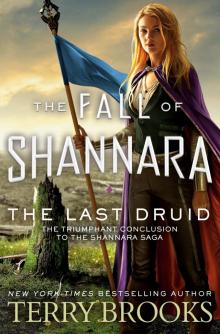 The Last Druid
The Last Druid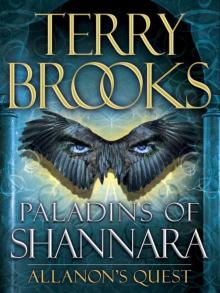 Paladins of Shannara: Allanon's Quest
Paladins of Shannara: Allanon's Quest Sometimes the Magic Works: Lessons From a Writing Life
Sometimes the Magic Works: Lessons From a Writing Life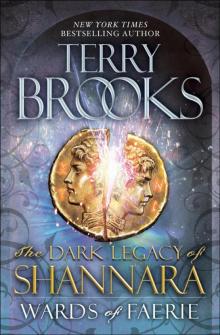 Wards of Faerie: The Dark Legacy of Shannara
Wards of Faerie: The Dark Legacy of Shannara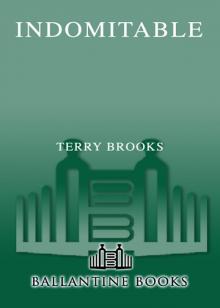 Indomitable: The Epilogue to The Wishsong of Shannara
Indomitable: The Epilogue to The Wishsong of Shannara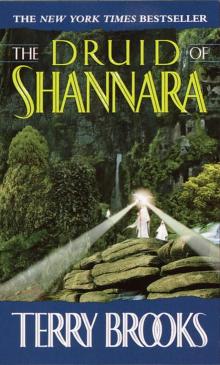 Heritage of Shannara 01 - The Druid of Shannara
Heritage of Shannara 01 - The Druid of Shannara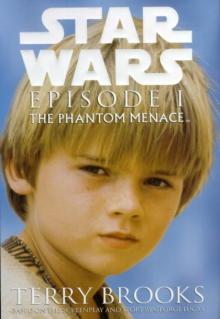 Star Wars - Phantom Menace
Star Wars - Phantom Menace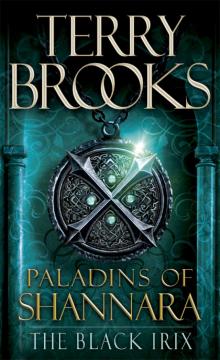 The Dark Legacy of Shannara Trilogy 3-Book Bundle
The Dark Legacy of Shannara Trilogy 3-Book Bundle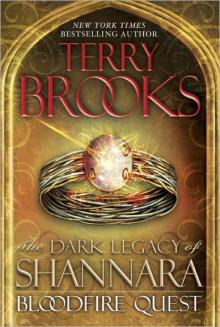 The Bloodfire Quest
The Bloodfire Quest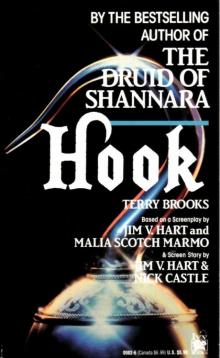 The Hook (1991)
The Hook (1991)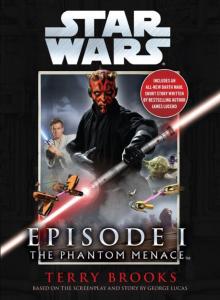 Star Wars: Episode I: The Phantom Menace
Star Wars: Episode I: The Phantom Menace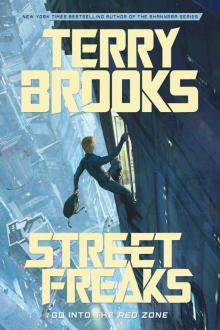 Street Freaks
Street Freaks The Sword of Shannara & Elfstones of Shannara
The Sword of Shannara & Elfstones of Shannara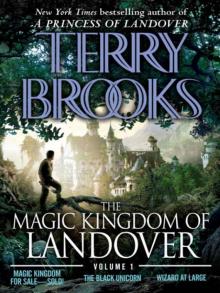 The Magic Kingdom of Landover , Volume 1
The Magic Kingdom of Landover , Volume 1 The Phantom Menace
The Phantom Menace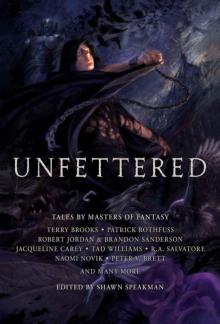 Unfettered
Unfettered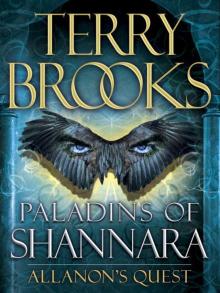 Allanon's Quest
Allanon's Quest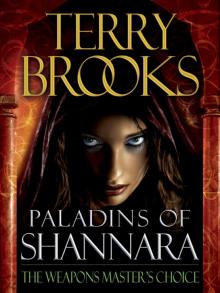 Paladins of Shannara: The Weapons Master's Choice
Paladins of Shannara: The Weapons Master's Choice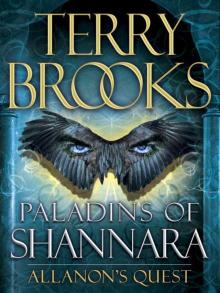 Terry Brooks - Paladins of Shannara - Allanon's Quest (Short Story)
Terry Brooks - Paladins of Shannara - Allanon's Quest (Short Story)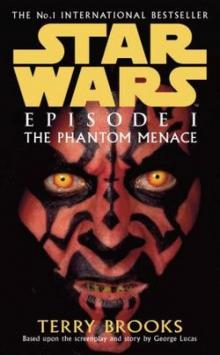 Star Wars Episode I: The Phantom Menace (star wars)
Star Wars Episode I: The Phantom Menace (star wars)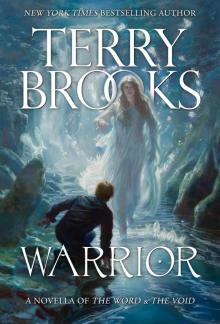 Warrior (The Word and the Void)
Warrior (The Word and the Void)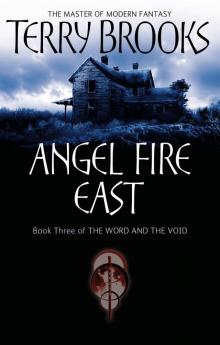 Word & Void 03 - Angel Fire East
Word & Void 03 - Angel Fire East![[Magic Kingdom of Landover 05] - Witches' Brew Read online](http://i1.bookreadfree.com/i2/04/05/magic_kingdom_of_landover_05_-_witches_brew_preview.jpg) [Magic Kingdom of Landover 05] - Witches' Brew
[Magic Kingdom of Landover 05] - Witches' Brew The Magic Kingdom of Landover - Volume 2
The Magic Kingdom of Landover - Volume 2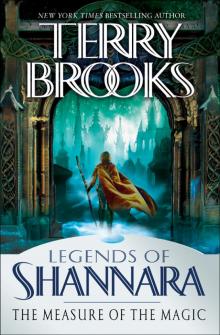 The Measure of the Magic
The Measure of the Magic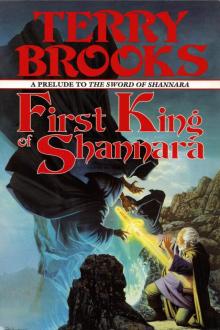 The First King of Shannara
The First King of Shannara Sometimes the Magic Works
Sometimes the Magic Works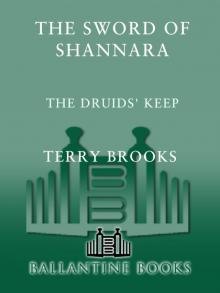 The Sword of Shannara, Part 2: The Druids' Keep
The Sword of Shannara, Part 2: The Druids' Keep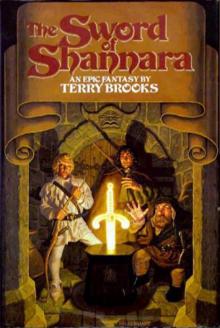 The Sword of Shannara tost-1
The Sword of Shannara tost-1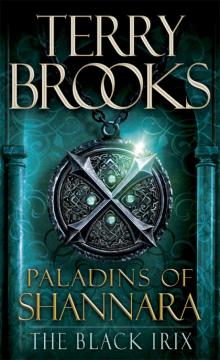 Paladins of Shannara: The Black Irix (Short Story)
Paladins of Shannara: The Black Irix (Short Story) Tangle Box
Tangle Box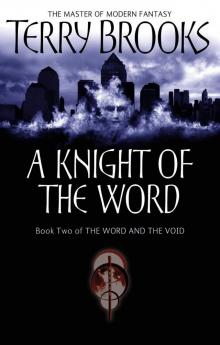 Word & Void 02 - A Knight of the Word
Word & Void 02 - A Knight of the Word The Sword of Shannara, Part 1: In the Shadow of the Warlock Lord
The Sword of Shannara, Part 1: In the Shadow of the Warlock Lord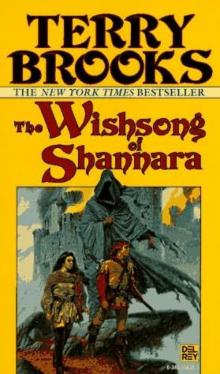 The Wishsong of Shannara tost-3
The Wishsong of Shannara tost-3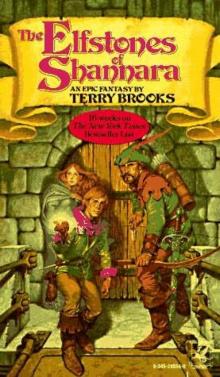 The Elfstones of Shannara tost-2
The Elfstones of Shannara tost-2